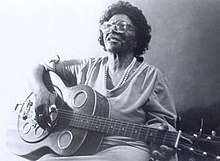Flora Molton
Flora Molton (née Rollins; March 12, 1908 – May 31, 1990) was an American gospel music street singer. Born partially blind due to cataracts, Molton was the daughter of a minister. She sang and played slide guitar on the streets of Washington, D.C., and did not perform in formal venues until late in life. Molton toured in Europe in the 1980s and continued to perform as a street singer until a few months before her death.
Flora Molton | |
|---|---|
 | |
| Background information | |
| Birth name | Flora Rollins |
| Born | March 12, 1908 Louisa County, Virginia |
| Died | May 31, 1990 (aged 82) Washington, D.C. |
| Genres | Gospel blues |
| Occupation(s) | Street singer |
| Instruments | Slide guitar |
| Years active | 1943–1989 |
| Associated acts | Phil Wiggins |
Early life
Molton was born in 1908 in Louisa County, Virginia.[1] She was born partially blind, and though she thought that she would be able to read large print, her schoolteachers taught her from memory. At the age of eight, Molton underwent surgery for cataracts, and her vision improved slightly. Though she was still discouraged from reading, by her teens she was comfortable reading large print.[2]
Molton's father was a minister who preached at several West Virginia churches. Molton's mother, an organist, stayed behind in Virginia to raise her children. Molton was baptized at age seven and she began preaching at the age of 17. A few years later, Molton became a member of the Holiness Church and started a ministry out of her home.[2] Supporting two children, she found that there was no money in her preaching.[2] In 1937, Molton moved to Washington, D.C., and began to sing on the streets in the 1940s.[3]
Music
Playing a guitar, singing and tapping a tambourine with her foot, Molton occupied the corner of 7th Street NW and F Street NW. She attached a plastic pail to her guitar where passersby left money. Later, Molton moved to the corner of 11th Street NW and F Street NW.[3] Though Molton tried to find other employment and completed a job training program with LightHouse for the Blind, her visual impairment complicated her search for a job and she found herself going back to street singing.[2]
Molton listened to blues singers like Blind Lemon Jefferson as a child.[3] She said that she sang the blues in her early years on the streets, but her song lyrics became less secular in later years.[4] Molton described her music as having a "country" sound, and her songs generally reflected her religious faith. She wrote at least one anti-war song, Sun Gonna Shine in Vietnam One Day.[3] Among the last well-known Washington street singers, Molton played slide guitar in open D tuning.[5] Her guitar technique is also described as "bottleneck", owing to the fact that she slid a broken bottleneck along the strings to make chord changes.[3]
Molton did not record her music or make scheduled performances until fairly late in life; a 1963 performance in a coffee shop was her first scheduled event. Subsequently, she gave concerts and performed at music festivals.[2] Phil Wiggins, a blues singer later known as part of Cephas & Wiggins, said that he developed his style during the years he spent accompanying Molton.[6]
The DC Commission on the Arts and Humanities presented her with four awards, and she went on a 1987 tour of Europe.[3] The commission gave her a grant to record an album, I Want to Be Ready to Hear God When He Calls.[7] A short documentary film about Molton, Spirit and Truth Music, was made by Edward Tim Lewis of Howard University.[8]
Later life
Molton was divorced from her first husband, Haywood Bruce, and predeceased by her second husband, Walter Molton.
She died at Greater Southeast Community Hospital in Washington on May 31, 1990, after suffering from liver problems. Though she was in her eighties, Molton had continued to sing on the streets until she got sick about six months before her death.[3] She was survived by four children and numerous grandchildren and great grandchildren.[3] She was buried at National Harmony Memorial Park in Landover, Maryland.[9]
References
- Santelli, Robert (1993). The Big Book of Blues: A Biographical Encyclopedia. Penguin. ISBN 9780140159394.
- Reagon, Bernice (March 1, 1974). "Lady street singer". Southern Exposure. Retrieved February 4, 2017.
- Barnes, Bart (June 22, 1990). "Popular D.C. street singer Flora E. Molton dies". The Washington Post. Retrieved February 4, 2017.
- Clines, Francis X. (October 15, 1985). "The sounds of the city". The New York Times. Retrieved February 5, 2017.
- Komara, Edward; Lee, Peter (2004). The Blues Encyclopedia. Routledge. ISBN 9781135958329.
- Owens, Clay (January 11, 2008). "Piedmont blues men return to the Avalon Saturday". The Star Democrat. Retrieved February 4, 2017.
- Atkins, Joe (November 24, 1988). "D.C. street-singer a capital attraction for past 48 years". Courier-Post. Retrieved February 4, 2017.
- Hall, Carla (April 14, 1988). "The auteurs of Howard". The Washington Post. Retrieved February 5, 2017.
- Eagle, Bob L.; LeBlanc, Eric S. (2013). Blues: A Regional Experience. ABC-CLIO. p. 290. ISBN 9780313344244.